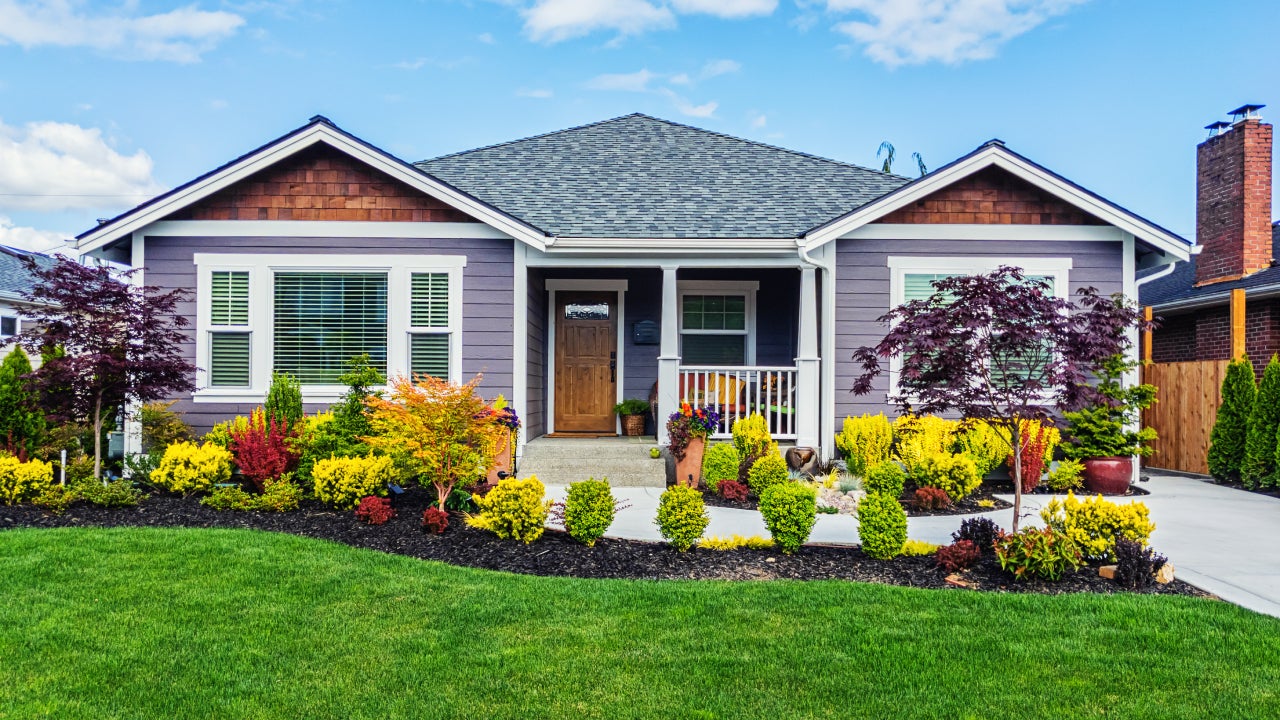As a homeowner, whether you’re preparing to sell, looking to refinance or just curious how much equity you have, you’ll need to have a good idea of how much your home is worth. There are various ways to get to the bottom of that question, including old-fashioned research, online tools and professional assessments. Some of these options provide more accurate information than others, so let’s take a closer look at all the ways to determine your home’s value.
How to determine home value through research
To get started, it is possible to do your own research to arrive at a ballpark estimate of your home’s value. You’ll need to consider its value when you purchased it, and how the market has changed since that time. Have area prices increased in recent years? If so, by how much? Or is your local real estate market experiencing a downturn? Look at pricing trends on websites like Redfin, Zillow and Realtor.com and then use that information to inform what your home may currently be worth.
One benefit of conducting your own research is that it’s free — you don’t have to pay a professional for their time and expertise. But your estimate may not necessarily be correct: “Home valuation is very nuanced, and there are many different factors that go into arriving at an accurate price,” says agent Jared Blumberg, co-founder of the Werner Blumberg team with Compass in New York City.
You can obtain more information by checking county and municipal websites for your home’s assessed value. Auditors periodically assess the value of residential properties for property tax purposes, and this information is public and searchable online. You can look up the assessed value of your house to see if it has appreciated, or compare the figures with other nearby homes for sale. The drawback of this data is that the estimate is for the taxable value of your home, not its fair market value — the assessment may not reflect some of the market factors that affect sale price, and in some cases, assessed values may be far off from market values.
The Federal Housing Finance Agency’s House Price Index calculator offers yet another take on how to determine home value. The tool doesn’t estimate the market value of a particular house, per se — instead, it analyzes historical mortgage data to project what homes in a state or metropolitan area are likely to be worth based on the rate of appreciation of all homes in the area over a given period. Basically, it offers a look at home price appreciation or depreciation over time.
Online solutions
For a quicker approach on how to determine home value, try searching real estate sites for recently sold nearby homes that are similar to yours to see how much they sold for. There are also many free online tools that offer estimates. Called automated valuation models, or AVMs, these use algorithms and publicly available data, such as recent sales, tax assessments and other public records, to generate an estimate. Each one uses a different methodology, so the estimates can vary (sometimes by quite a bit).
Some of the home value estimators available online include:
In addition to using an online estimator tool, you might choose to see how much an iBuyer is willing to offer for your home. These online companies — two of the best-known are Opendoor and Offerpad — buy homes that meet their criteria directly from homeowners, in cash. However, these companies do need to make a profit, so they typically offer less than market value for homes.
Get a comparative market analysis
Reaching out to a local real estate agent who knows your market is another option. Agents can compile a thorough comparative market analysis to arrive at the market value of your home. (Many will do this for free, though some might not offer it unless you retain their services to sell.) They review recent area sales of homes comparable to yours, known as “comps,” and also incorporate their own knowledge of the neighborhood, as well as any factors that are unique to your property.
“A comparative market analysis is a detailed look at the overall landscape of the housing market as it relates to the property being evaluated,” says Blumberg. “It should encompass similar properties to yours that have recently sold, entered into contract and also that are currently on the market. These three different property types are all important to the overall analysis. Each one provides a different insight to achieve the most accurate valuation for your home.”
When reviewing sales data related to other properties, agents will generally look for homes that are of a similar square footage and quality as your home, as well as on a similar lot size and with the same amount of bedrooms and bathrooms. The analysis may also take local market conditions into consideration.
Get a professional home appraisal
A licensed appraiser is another pro who can provide an estimate of your home’s value. Home appraisals are objective, professional assessments that are usually based on an in-person review of your property, as well as an analysis of recent comps and a review of public records.
A home appraisal isn’t free — the average cost is around $350, according to Angi — but it’s likely to be much more accurate than an online estimate. It can also be useful if your home is unique or there aren’t many comps available: “If you don’t live in an area with many recent sales, it may be best to ask an appraiser to come out and give their valuation,” says Sacha Rady, a Realtor with Engel & Völkers in Atlanta.
Understanding fair market value
This is a complicated concept: A home’s fair market value is what prospective buyers would be willing to pay for it on the open market. The amount is based on numerous factors, including a home’s location, size, age and condition.
But it’s also impacted by less tangible things, like seasonality and specific market conditions. For example, the fair market value of the same home may be lower in a buyer’s market, where inventory is plentiful and buyers have numerous options, than it would be in a seller’s market, with more buyers than there is available inventory.
If a market is very competitive, bidding wars can drive market value up higher than expected. “If you have multiple buyers interested in the same home, you may find that the market value is bid up,” says Rady. “This can cause the home’s market value to be higher than its appraised value.”
Fair market value is the price prospective buyers are willing to pay for a home — it’s different from the appraised value, which is based on the opinion of a licensed appraiser, and the assessed value, which is how the local government determines property taxes.
When your home’s value increases
Your home’s value can rise due to various factors. For instance, home prices may increase in places where houses are in short supply, or places where the local economy is booming. If the value has increased significantly, you may consider selling your home for a nice profit. Even if you aren’t ready to sell, there are still considerations to think about:
- You might be able to save money: If you’re paying for private mortgage insurance (PMI) and your home’s value has gone up to the point where you now have at least 20 percent equity, you can ask your lender to cancel your PMI premiums. (They may require an official appraisal.)
- You might need to adjust your insurance: Your homeowners insurance cost and coverage are related to your home’s value, in that they are based on the cost that would be required to rebuild. If your home appreciated because you renovated or built additions and would now cost more to rebuild, your policy might need adjusting.
- You might be in a better position to make improvements: With more equity in the property, you can potentially take advantage of a home equity loan and invest in a renovation or remodeling project.
When your home’s value decreases
While home values have generally increased across the country, there could be factors beyond a homeowner’s control that can cause prices to decline. These could include a downturn in the local economy, impacts from climate change or severe weather or even local political issues. If you can afford to wait out the market rather than selling at a low point, that may be the smartest option.
How to add value to your home
Now you know how to determine home value, but what can you do if you’d like to increase it? There are several ways to do so. Start with first impressions: Ensure the property has good curb appeal and looks welcoming from the outside. Be sure the house is well maintained inside, too.
Depending on which projects you choose, this effort doesn’t have to be very expensive. “Painting, landscaping, switching out old light-switch plates or doorknobs will all pack a punch when it comes to improving your home’s value,” says Rady.
Some more substantial efforts that typically offer a solid return on investment include energy efficient improvements and minor kitchen and bath remodels (as opposed to full gut renovations).
“If you renovate any part of the home be sure to do it tastefully, timelessly and thoughtfully,” says Blumberg. “A renovation that is for a specific taste or need may wind up being a poor investment later on, if you are the only one who likes it.”
FAQs
-
Online estimation tools determine pricing using algorithms that rely on publicly available information. These algorithms can vary widely from one tool to the next and typically don’t account for a home’s current condition or any upgrades or renovations that are not reflected in public records. So they are not as accurate as in-person methods, like a real estate agent’s comparative market analysis or an appraiser’s official appraisal price.
-
No. A home’s fair market value is whatever buyers would be willing to pay on the open market, whereas appraised value is determined based on the opinion of a professional, licensed appraiser. A home’s fair market value may be higher or lower than its appraised value, depending on market conditions.
-
Your home’s sale price is not the same as your profit. There are numerous costs associated with selling a home: For example, the existing mortgage must be paid off and closing costs and Realtor commissions must be paid. Subtract all associated costs and expenses from the sale price in order to determine how much you will keep from the sale.
Read the full article here

















